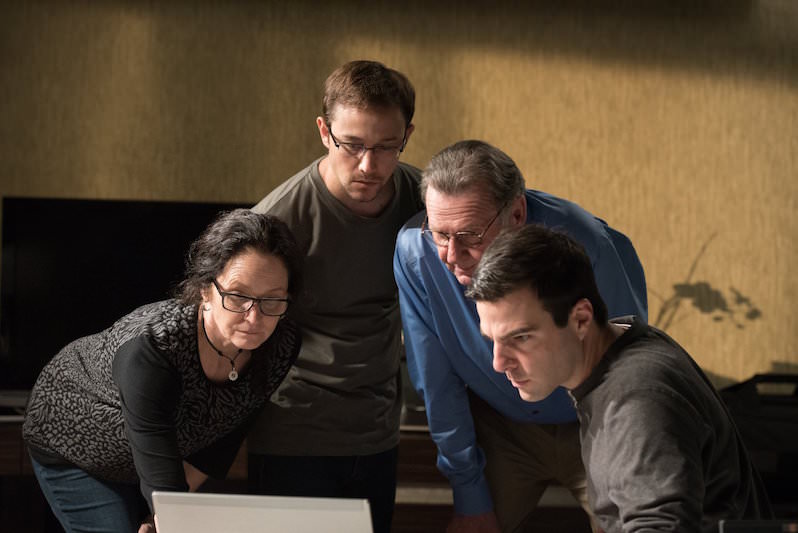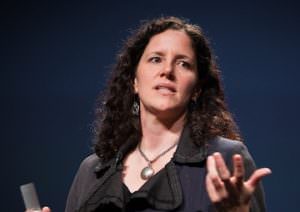A Subtler Oliver Stone Is Back in Top Form With ‘Snowden’
Joseph Gordon-Levitt’s quietly gripping performance, complemented by Stone’s smartly subdued direction, makes for a top-notch treatment of the former National Security Agency contractor’s real-life suspense story.
From left: Melissa Leo (as Laura Poitras), Joseph Gordon-Levitt (as Edward Snowden), Tom Wilkinson (as Ewen MacAskill) and Zachary Quinto (as Glenn Greenwald) get into character in Oliver Stone’s “Snowden.” (IMDb)
In “Citizenfour,” Laura Poitras’ riveting documentary about Edward Snowden, the whistleblower quietly observes that it would be a mistake to make him the focus of his 2013 revelations of the breadth and depth of the National Security Agency’s surveillance of civilians. In other words, don’t blame the messenger—blame the NSA for reading your email messages.
Yet Oliver Stone’s “Snowden,” starring a ghostly Joseph Gordon-Levitt, proves that focusing on the intelligence contractor himself is not a mistake. As subtly drawn as it is politically urgent, “Snowden” is a very good film with a phenomenal performance by Gordon-Levitt at its center. Movie and performance are forceful precisely because they make palpable the subject’s growing moral revulsion at the extent of U.S. surveillance. Likewise his shock at how some of his superiors view intel as a gambit in what resembles a video game that one of them calls, “You track ’em, we whack ’em.”
READ: Oliver Stone Warns Against Surveillance Capitalism and ‘Pokémon Go’
“A director makes only one movie in his life. Then he breaks it up and makes it again,” said filmmaker Jean Renoir, who could have been describing the man who made “Snowden.” Like the best Stone films—“Platoon,” “Born on the Fourth of July,” “Wall Street”—“Snowden” is the story of a young idealist who suffers a moral crisis compounded by Oedipal fury against the father figure in whom he has lost faith.
In this case, young Edward (Gordon-Levitt replicating the real Snowden’s affectless, robotic voice), distinguishes himself as the star pupil of Corbin O’Brian (Rhys Ifans, shadowy and sinister), a composite CIA figure who shares a similar surname with O’Brien, the Thought Policeman of George Orwell’s “1984.” Snowden is attracted to the CIA because, as he explains to an instructor (Nicolas Cage), his “sin” is computers. Retorts the instructor, not completely joking, “Then you’ve come to the right whorehouse!” In Snowden’s desire to serve his country, he accepts postings in Geneva, Washington, D.C., and Hawaii, where he works on programs that he believes will safeguard U.S. security.
Yet the more Snowden learns of the post-9/11 intel protocols, the more he’s convinced that government agencies like the NSA and CIA are abusing the Fourth Amendment—the one that guarantees Americans’ right to privacy. For most of Gordon-Levitt’s terrific performance, he plays Snowden like one hiding in plain sight. But when his Snowden finds that a backup program he has designed to protect privacy is being used instead to invade it, his conscience—and colors—emerge, and he flinches as though shot through the heart. The wordless scene recalls J. Robert Oppenheimer’s horror when he saw the unintended consequences of the atomic bomb on Japanese civilians and said, “We physicists have known sin.”
While prior Stone films have tended toward the feverish and the palpitating, this one is a comfortable 98.6 degrees and conspicuously lacks the director’s customary agit-editing. As a result, the viewer is calmly able to take it all in without incitement—especially its allusive, and often poetic, imagery. One of the many stunning shots depicting Snowden’s shifting perspective shows him walking down a hotel corridor with a mirrored ceiling and shiny surfaces. The ceiling reflects a man negotiating a world upside down.
Stone and co-screenwriter Kieran Fitzgerald flesh out their central character by showing how Snowden’s work encroaches on his domestic life with Lindsay Mills (Shailene Woodley), a young woman as outgoing as Snowden is introverted. It’s clear why Snowden is attracted to her: She’s lively and sociable. It’s also clear that he can’t tell her what’s eating him—because, of course, it’s classified. The movie frames Snowden as man in need of a confessor.
While obviously sympathetic to its subject, “Snowden” is more a movie of questions rather than of answers. Implicitly it asks how—and whether—Americans can enjoy both privacy and security. Or whether we have irrevocably traded the former for the latter. One question Stone’s movie specifically does not ask is whether its subject is a patriot or a traitor.
As to the film’s veracity? All biopics shift chronology for dramatic effect. This one suggests that Snowden did not begin illegally downloading files until 2013, although many sources say he actually began in 2012. While the film lacks the breaking-news immediacy of Poitras’ documentary, it has more distance from and context for Snowden’s decision.
As in “The Social Network” from 2010, “Snowden” explores the brave new cyber-world to show how it is reshaping both human and political relationships. Given this week, when Colin Powell’s private e-mails have been hacked and Snowden, in Russia, has petitioned for a presidential pardon from Obama, Stone’s film carries some weighty extra-cinematic baggage I can’t even begin to sort out.
But what I can say with complete confidence is that, like its subject, “Snowden” speaks softly and carries a big wallop.
Independent journalism is under threat and overshadowed by heavily funded mainstream media.
You can help level the playing field. Become a member.
Your tax-deductible contribution keeps us digging beneath the headlines to give you thought-provoking, investigative reporting and analysis that unearths what's really happening- without compromise.
Give today to support our courageous, independent journalists.






You need to be a supporter to comment.
There are currently no responses to this article.
Be the first to respond.